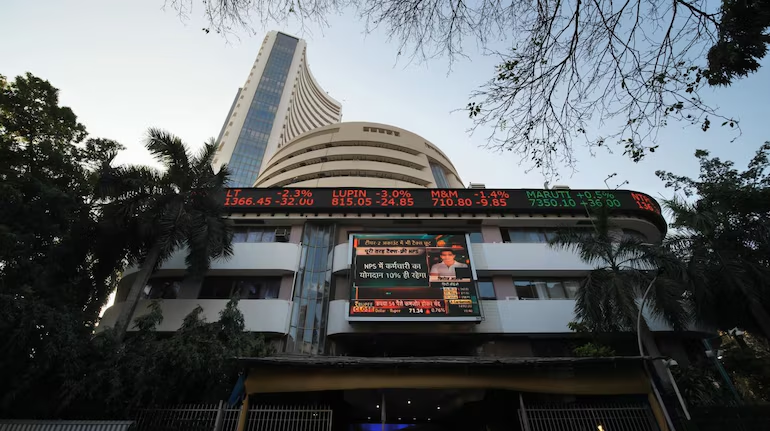Dual Shocks Hit Investor Confidence: Global geopolitical tensions, triggered by Israel’s “Rising Lion” operation against Iran, combined with the devastating Air India crash, have created a perfect storm for Indian equities. Brent crude oil prices spiked over 8%, raising inflation concerns for India, an 80% oil importer, further dampening investor confidence across all sectors.
BY PC Bureau
June 13, 2025 – Indian stock markets experienced a sharp decline in early trading on Friday, June 13, 2025, as global geopolitical tensions escalated following Israel’s preemptive airstrikes on Iran’s nuclear facilities, including the Natanz uranium enrichment site. The strikes, coupled with the tragic Air India Flight AI171 crash in Ahmedabad on June 12, which killed 265 people, including two Manipuri crew members, have intensified a risk-off sentiment among investors, leading to significant losses across major indices.
The BSE Sensex and NSE Nifty50 opened sharply lower, reflecting global market jitters. As of 8:20 AM IST, GIFT Nifty futures were trading at 24,629, signaling a nearly 1% drop from the Nifty50’s previous close of 24,888.2, according to India Today. By mid-morning, the Sensex had plummeted over 1,200 points, a decline of approximately 1.5%, while the Nifty50 fell below 24,700, shedding more than 300 points or 1.2%, as reported by posts on X and market updates. The broader market saw steeper losses, with the Nifty MidCap and SmallCap indices dropping 2.5% and 3%, respectively, amid fears of a prolonged Middle East conflict.
Black Friday in Indian stocks market, #Sensex, #Nifty down over 1.5%, as Israel attacks Iran pic.twitter.com/iSbgiNq36p
— Apeksha Sandesh (@apekshasandesh_) June 13, 2025
Israel’s “Rising Lion” operation, which targeted Iran’s nuclear sites and military infrastructure, including the killing of IRGC commander Hossein Salami and two nuclear scientists, sparked fears of retaliatory missile strikes from Iran. This escalation drove Brent crude oil prices up 8.3% to $73.75 per barrel, the largest single-day increase since March 2022, exacerbating concerns for India, which imports over 80% of its oil. Rising oil prices threaten inflationary pressures, higher import costs, and potential disruptions to economic growth, all of which have dented investor confidence.
READ: Israel Strikes Iran: Oil Surges, Markets Dip, Tension Soars
The Air India crash, involving a Boeing 787-8 Dreamliner that killed 241 onboard and 24 on the ground, added to domestic unease, with aviation stocks like InterGlobe Aviation (IndiGo) and SpiceJet expected to face scrutiny. The Tata Group, which owns Air India, also saw its stocks, including Tata Motors and Tata Steel, under pressure, contributing to the market’s downturn.
Sectoral Impact and Investor Behavior
All sectoral indices traded in negative territory, with Nifty Auto, Realty, and Oil & Gas among the hardest hit, each falling over 2%. Major Sensex losers included Reliance Industries (down 3%), Tata Motors (2.5%), and Larsen & Toubro (2%), reflecting the market’s sensitivity to oil-dependent and industrial sectors. Foreign Institutional Investors (FIIs) sold shares worth ₹3,831 crore in the previous session, while Domestic Institutional Investors (DIIs) continued their 18th consecutive session of net buying, providing some cushion.
VLA Ambala, a SEBI-registered research analyst at Stock Market Today, noted, “We can expect Nifty to find support between 24,750 and 24,670 and face resistance near 25,020 and 25,100 in the next session,” suggesting a volatile but potentially stabilizing range. However, posts on X, such as one by @InvestorOfJAMMU, predicted a sharper correction, with small and midcap indices potentially crashing 5% and the Nifty filling a gap at 24,150.
Broader Economic Context
The market crash aligns with global volatility, as the MSCI Asia ex-Japan index fell 0.4% and U.S. stock futures dipped, per Reuters. Investors rushed to safe-haven assets like gold, which climbed 1% to $3,419 per ounce, and the Swiss franc. India’s low retail inflation of 2.82% in May, the lowest in six years, offers some relief, supporting the Reserve Bank of India’s recent interest rate cuts to boost growth. However, rising oil prices could reverse these gains, increasing costs for businesses and consumers.
Dr. V.K. Vijayakumar, Chief Investment Strategist at Geojit Financial Services, warned, “If Israel targets Iran’s oil infrastructure in retaliation, we could see a huge spike in crude prices, which would be particularly damaging for oil importers like India.” This echoes concerns from October 2024, when Iran’s missile strikes on Israel caused the Sensex to drop 1,832 points intraday, wiping out ₹13 lakh crore in investor wealth over five sessions.
READ: Israel Strikes Iran’s Nuclear Sites, Tehran Vows Retaliation
Historical Perspective
India’s stock markets have historically been sensitive to geopolitical shocks. The BSE Sensex and Nifty have experienced significant crashes, defined by the Financial Times as a double-digit percentage fall in five minutes or a 9–10% decline within days, as seen in 2008 and 2015. The current downturn, while not yet a “crash” by these metrics, reflects similar patterns observed during past Middle East tensions, such as the 2024 Iran-Israel conflict and the 1973 oil embargo, which saw oil prices skyrocket.
Market experts urge caution, with Santosh Meena of Swastika Investmart suggesting that long-term investors could find buying opportunities in large-cap stocks if the correction deepens. Defensive sectors like pharmaceuticals and FMCG are recommended to mitigate risks. The market’s trajectory hinges on Iran’s response, with fears of missile or drone attacks potentially exacerbating volatility. The UN Security Council’s emergency session later today and the stalled U.S.-Iran nuclear talks in Oman will be critical in determining whether tensions de-escalate or spiral further.













